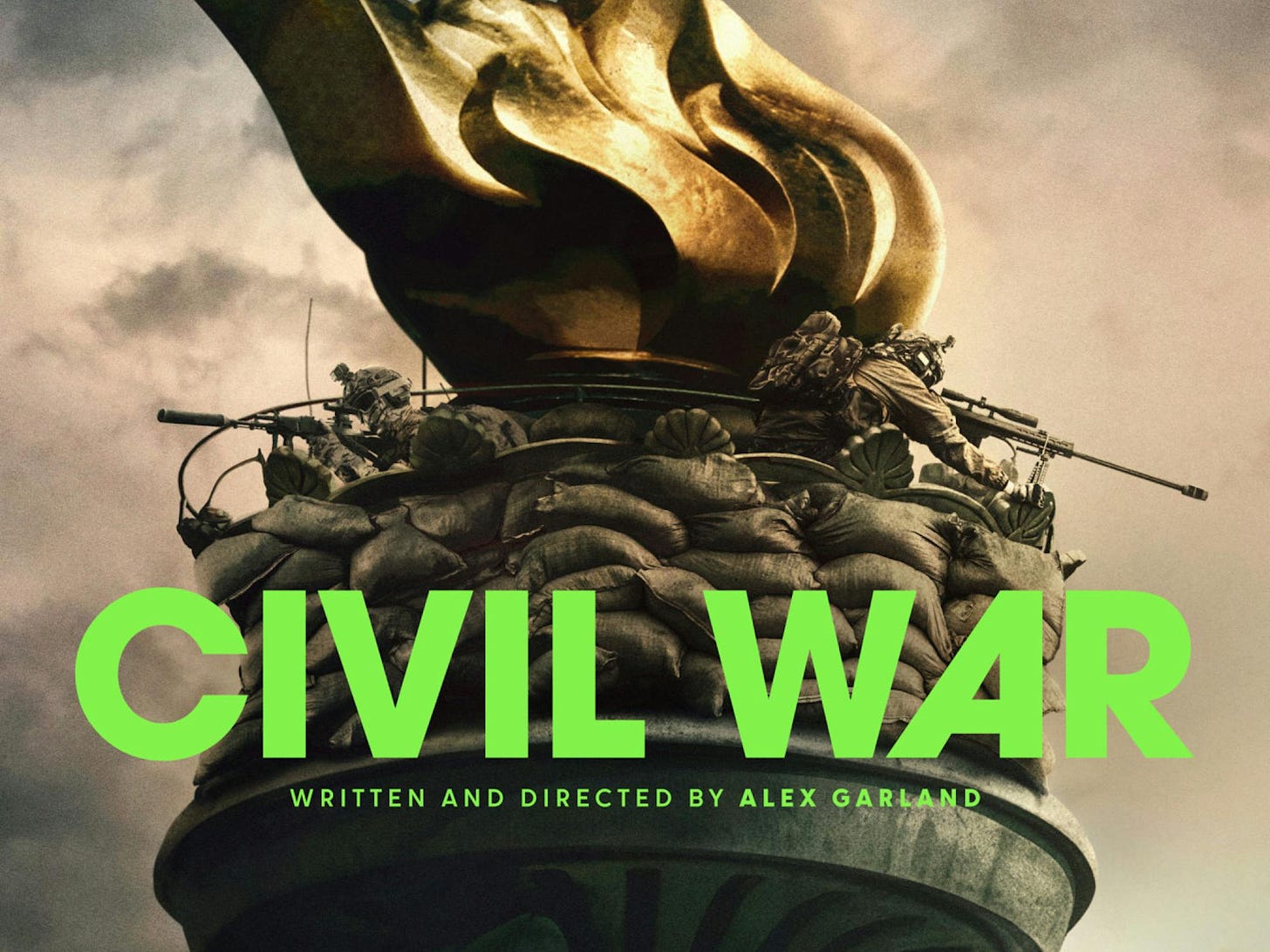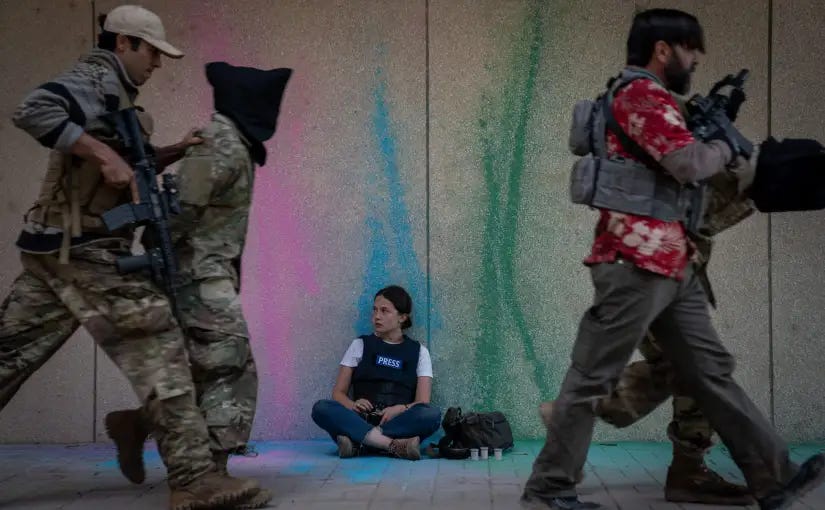A Socratic Dialogue About CIVIL WAR (2024)
And a very Western Forces wine to drink while watching.
Socrates: It doesn't matter what the war is about.
Student: Just that war is hell?
Socrates: Perhaps, though the film is not necessarily anti-war. The only villain of the piece (outside of white supremacists, a term we totally had in Ancient Greece) was the President, the leader who sacrificed any and all but never himself.
Student: So it's anti...leadership?
Socrates: No. The armies and local militias each have leaders. The press have their own code of conduct and hierarchies. Whatever comes after the war will undoubtedly be another leader, likely another President. But the film is a cautionary tale about what kind of leader would foment a civil war in the 21st century, and how much misery a country would have to suffer, as such a leader would never back down, never look for ways to minimize the damage. Even those closest and most loyal to him, he threw them to the slaughter without hesitation, then whimpered for his life when it did not allow for his escape. (*sip*, *slurp, slurp, slurrrrp*)
Student: So then it must matter what this President did. How he led, what his ultimate goals were.
Socrates: It does not. The movie is a Rorschach test, a thing we Ancient Greeks invented long before Rorschach, the little shit. The viewer's response to the story tells us what they fear most, hope for most, hate most, love most, and whether it is hope or fear, love or hate that is foremost within their current state of mind. When they complain that the movie doesn't tell them <*blank*>, you know what they believe to be the most critical, potential cause for a civil war. It tells you from which direction they believe it must come from. (*sip*, *slurp, slurp, slurrrrp*)
Student: Okay, so...the war could be about anything, even everything.
Socrates: A Schrodinger's Cat motivation! Schrodinger lives right down the road from me, I know all about this.
Student: So if the war *could* be about anything, the Western Forces - those against the official ruling government in the film - could be in the wrong.
Socrates: They could, or at least have beliefs and/or motivations that any given viewer would not agree with.
Student: How can the viewer know which side to root for without this information?
Socrates: It does not matter. You're not meant to root for any particular side. You're meant to see the tragedy of a people without true differences killing one another at the command of another. For every Perdiccas II who sought to shore up power by instigating rebellion between city-states, there is also an Archelaus I, a leader who shores up power through unforced unity. It should be noted that the latter has historically led to stronger military might and political standing, including in Ancient Greece. Rebellion is simply unstable. And instability is instability. (*sip*, *slurp, slurp, slurrrrp*)
Student: Jesus, can you stop tha- wait, are you drinking?
Socrates: Of course! I always pair a Dionysian beverage with any work of artistic expression!
Student: I don't really know why I'm asking, but, *sigh*, what did you pair with Civil War?
Socrates: I am drinking a 100% Mourvèdre, a grape that has come into its own in the States of California and Texas, the two States that make up the Western Forces in the film, and two States you would not expect to find many commonalities between.
It's a grape known for its balance when grown in these regions. Medium to medium plus color, intensity, acidity, and body. It makes for a red wine that has a certain power and character, fruit and florals and a touch of earth, a sweetness that does not overpower. It is an independent! Yet also known for its function as a blending partner, notably in a Rhone-style "GMS" blend partnered with Grenache and Syrah. It is a wine that is perfect for a film about tragedy and atrocity that plays it down the middle, never overreaching into melodrama or overt politicization. But also a wine that can harmonize with others, as any state within the United States should ideally do. As a tasting experience and as a metaphor, it is unrivaled for this movie! (*sip, slurp, slurp, slurrrrrp*)
Student: Huh. That's...actually not bad. I like that. I don't think I like the movie, though.
Socrates: Ah, because it does not vilify a known way of thinking in the modern world?
Student: If we go to another country in the midst of a civil war, are we not to care why either side is fighting? What they're fighting for? It's pure cynicism not to.
Socrates: We might. Possibly we must, as human beings. But the film's purpose is to zero in on the actor or actors who do not want the war to end without absolute victory. Those who gain more from a war than in avoiding one or ending one, regardless of the human cost. And such people rarely see battle themselves.
Student: What about Alexander the Great?
Socrates: Alexander the who?
Student: Oh, right, after our time.
Socrates: Think about this: the lead character only suffers when she begins to care. It is only when she no longer wishes to see others die, that she risks her own wellbeing. To care, is to risk. Civil war, then, is the opposite of this: it is to violently, homicidally refuse all risk. You will throw any life you do not personally care about onto any pyre until you control all and risk nothing.
Student: But we live in the here and now. We have just emerged from a Peloponnesian War and may still stumble into another. To feign to...rise above it all...to care nothing for the whys and wherefores of a potential future war is simply...it's a dodge. It's false equivalency for all possible sides.
Socrates: Death is a great equalizer.
Student: That's just a platitude.
Socrates: Did you just name a word after yourself?
Plato (Student): No, it's a French...you know what, I can tell when you're drunk. You get defensive.
Socrates: You wrote all this down though, right? I won this one so I want it written down.
Plato: Nobody “won”. And I didn't care enough to write it down.
Socrates: And you see? Not caring is to risk nothing.
Plato: You're such a dick.
Socrates: Fair.
Socrates: (*sip, slurp, slurp, slurrrrrp*)









Quite the read. Not sure my mental health can handle the movie currently- but it is on the list when I am able to watch something other than British cozy fluff shows 🫣😂
Seriously the best take on this film I’ve seen. I didn’t know how to touch it. I really disliked it. Overly pretentious and much ado about nothing but that said there’s still stuff to glean I’m sure. Just spoon feed me please